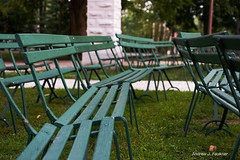I recently stumbled across an article detailing new playgrounds in Germany specifically created for senior citizens (or at least older adults seeing as the low age of the spectrum is 60). Now, as regular readers might note, this particular blogger firmly believes that play, like learning must be a lifelong process. [Of course true play itself is a form of learning through the construction of simulated reality and/or exploration of boundaries...]
That being stated I have some major reservations about this kind of application. The logic being used to justify such a segregated space is bluntly put:
“Retired people need a space to be themselves without someone coming along and spilling ice-cream on their trousers or breakdancing,” said Andrea Weber, a social worker specialising in the lifestyle of the elderly. “They need to feel safe.”
While I understand that, in most cases, the aging process leads to a lack of flexibility and increased apprehension of danger (some might term that wisdom) I do not believe that it is healthy as a society to create a safe place for our elders by separating them from "our" public spaces. Ironically, by creating public space that effectively ‘wharehouses’ seniors, one might actually be creating the potential for much more crime given the alarming rates at which seniors are preyed upon.
To take another tack, I might guess that a majority of our population remembers fond interactions with senior citizens in our youth. My father still remembers fondly (by name even) the old italian guys that lived in his building and on his block half a century ago. If we consider such classic public spaces as Washington Square in New York we encounter a mix of demographics ranging from the elderly talking or playing chess to the young splashing in fountains and chasing pigeons. I am not a psychologist or sociologist by any means, but I will argue that such intergenerational and cross-demographic contact both helps social cohesiveness and fosters responsibility to others in society. Finally, I have noticed that when seniors get very old (beyond the point of any sustained exertion) they often find great comfort in simply observing life around them. Shortly before my grandfather died from heart failure he would find what appeared to be great pleasure simply sitting on the couch and watching three generations of his family swirl around him. Although I cannot put myself in his place, I can understand how gratifying that might be after almost a century of life.
If places for senior citizen recreation are designed as discreet nodes I feel it is this connection that will be lost. After all, after many decades of life would you rather spend your time with your extended family and friends or with those who coincidentally were born around the same time you were?
this made my night!
Posted by
Andrew J. Faulkner
on 11.18.2006
Posted in:
architecture,
Design Culture
/
Comments: (0)
Alexandre Orion: Subversive Commentary Through Erasure
I previously threw out a link (I believe in the site feed -- Yet another reason to bookmark/syndicate the feed!) to a street/commercial artist in England who used the technique of cleaning dirty surface to both create art and advertising on public walls. While not technically a crime, this technique was quite controversial. I recently came across the new works of Alexandre Orion (via the Wooster Collective). I feel Orion's new series, titled Ossário, which consists of fields of skulls erased out of the petroleum grime of tunnels in São Paulo Brazil, is far more successful by being un-coopted by the forces it protests.

These images, with iconography seemingly derived from both comic book and Panamerican cultural traditions serve to question the toll of our dependancy on petroleum and other (and far more hazardous) chemicals. As the artist notes: "‘Cleaning’ is not a crime. What is a crime is the environmental damage caused by unashamed pollution." Interestingly, such an intervention is only possible as a result of the grime generated by the exact wasteful processes that they are critiquing. Therefore, the critical response becomes subversively part of the system it questions. As such the ultimate goal of this expression is to prevent its own existence by erasing the cause of its media (the grime caused by the abuse of the environment); this I feel has the capability to render it almost incorruptible by commodification. Although, given the way things have been shamelessly going, I wouldn't be surprised to see BP erasing ads out of the grime caused by their oil plumes. Anyway, back to the art:
As Professor José de Souza Martins of the University of São Paulo reflects:
"These images speak to us of love and hate. Love for the city we live in, love for the city we could have, love for an urban utopia that belongs to everybody not just for a few; love for those inhabiting the city who take it to heart and make it part of their own consciousness... Hate, because the city is being consumed in a predatory manner by... those who think they are smart because they appropriate that which does not belong to them."


These images, with iconography seemingly derived from both comic book and Panamerican cultural traditions serve to question the toll of our dependancy on petroleum and other (and far more hazardous) chemicals. As the artist notes: "‘Cleaning’ is not a crime. What is a crime is the environmental damage caused by unashamed pollution." Interestingly, such an intervention is only possible as a result of the grime generated by the exact wasteful processes that they are critiquing. Therefore, the critical response becomes subversively part of the system it questions. As such the ultimate goal of this expression is to prevent its own existence by erasing the cause of its media (the grime caused by the abuse of the environment); this I feel has the capability to render it almost incorruptible by commodification. Although, given the way things have been shamelessly going, I wouldn't be surprised to see BP erasing ads out of the grime caused by their oil plumes. Anyway, back to the art:
As Professor José de Souza Martins of the University of São Paulo reflects:
"These images speak to us of love and hate. Love for the city we live in, love for the city we could have, love for an urban utopia that belongs to everybody not just for a few; love for those inhabiting the city who take it to heart and make it part of their own consciousness... Hate, because the city is being consumed in a predatory manner by... those who think they are smart because they appropriate that which does not belong to them."

Refreshment
Posted by
Andrew J. Faulkner
Posted in:
photography
/
Comments: (0)

Refreshment
It was tricky to work the macro lens and the foot pump for the fountain at the same time while staying in focus... I'm sure passersby thought I was crazy
Originally uploaded by postmodern sleaze.
Delineation
Posted by
Andrew J. Faulkner
Posted in:
photography
/
Comments: (0)
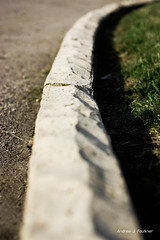
Delineation
The park on the whole reminds me of a book I treasured as a child: The Park Book. The only thing missing is the low ornamental iron borders around the paths. However, these beautiful limestone curbs may even be better...
Originally uploaded by postmodern sleaze.
In Training...
Posted by
Andrew J. Faulkner
Posted in:
photography
/
Comments: (0)
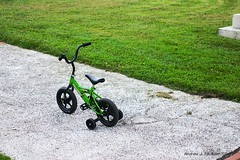
In Training...
I wondered why such a nice bike was so neatly abandoned in the middle of the park. I later discovered a young boy and his father sitting on the steps on the other side of a gazebo.
Originally uploaded by postmodern sleaze.
Processional
Posted by
Andrew J. Faulkner
Posted in:
photography
/
Comments: (0)
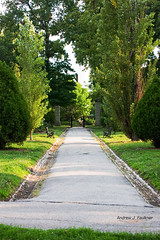
Processional
Despite the beauty of the afternoon the hour grows late and I must depart... damn good to because I hit a torrential thunderstorm in my car about 10 minutes later!
Originally uploaded by postmodern sleaze.
I know I promised to blog architecture next but...
Posted by
Andrew J. Faulkner
on 11.10.2006
Posted in:
Art,
development,
Urbanism
/
Comments: (0)
I feel I should mention the amazing goings on at 11 Spring Street in the Nolita area of Manhattan. The building, long a repository, if not a magnet, for street art will be converted into condos. So, you think, yet another story of gentrification erasing out illegal expression (or alternately another victory of generic neighborhood cleanup depending on your viewpoint)...

Well, that's where the situation becomes interesting. The developers of the property, a massive and long-abandoned horse stables turned icehouse, have joined forces with the Wooster Collective to have internationally famous street artists decorate the facade, culminating in a huge party in December

ABOVE
londonpolice
and
Michael DeFeo
have so far contributed works and one can only imagine who will drop by next. As the Wooster Collective website
notes:
"Watch this space - literally.
If you're an artist who we've featured on the Wooster website in the last 5 years and you're coming through Manhattan in the next six week, drop us a note.
And if you're in New York, don't make any plans for the second week in December ;)"
As "D" summarizes in his comments at Gothamist:
"There's a big vacant building on which people started to put up unauthorized art (or whatever), the owners responded by saying, "hey, let's get an artists' collective to curate the way the building is decorated so it has some cohesiveness and flow (and so that some established artists are inspired to contribute), the artists agree to abide by a deadline, it's all free (!!), there's gonna be a big party at the end, and everyone gets along?? No divisiveness? No bitterness? No unreasonable squattters [sic] demanding to stay rent free or artists demanding that the art be preserved forever? No black-hearted landlords crushing the art with wrecking balls?
No government intervention or regulation?
this is too good to be true."
I believe the art will be removed during the renovation next year, but given the temporal nature of the form I believe this offers a wonderful paradigm for cities with numerous abandoned buildings and buildings stuck "in progress." Here in St. Louis Chivvis Development did something similar (albeit with artists of much less renown) on several buildings it owns at Chouteaus Landing on S. Fourth. I think such "legal walls" offer an opportunity to enhance the visual density of the city, celebrate diversity, and at least partially redeem the gaps (or more specifically dents I suppose) left in the urban fabric by abandonments.
Here's to hoping we see much more of this phenomena both locally and nationally!

Well, that's where the situation becomes interesting. The developers of the property, a massive and long-abandoned horse stables turned icehouse, have joined forces with the Wooster Collective to have internationally famous street artists decorate the facade, culminating in a huge party in December

ABOVE
londonpolice
and
Michael DeFeo
have so far contributed works and one can only imagine who will drop by next. As the Wooster Collective website
notes:
"Watch this space - literally.
If you're an artist who we've featured on the Wooster website in the last 5 years and you're coming through Manhattan in the next six week, drop us a note.
And if you're in New York, don't make any plans for the second week in December ;)"
As "D" summarizes in his comments at Gothamist:
"There's a big vacant building on which people started to put up unauthorized art (or whatever), the owners responded by saying, "hey, let's get an artists' collective to curate the way the building is decorated so it has some cohesiveness and flow (and so that some established artists are inspired to contribute), the artists agree to abide by a deadline, it's all free (!!), there's gonna be a big party at the end, and everyone gets along?? No divisiveness? No bitterness? No unreasonable squattters [sic] demanding to stay rent free or artists demanding that the art be preserved forever? No black-hearted landlords crushing the art with wrecking balls?
No government intervention or regulation?
this is too good to be true."
I believe the art will be removed during the renovation next year, but given the temporal nature of the form I believe this offers a wonderful paradigm for cities with numerous abandoned buildings and buildings stuck "in progress." Here in St. Louis Chivvis Development did something similar (albeit with artists of much less renown) on several buildings it owns at Chouteaus Landing on S. Fourth. I think such "legal walls" offer an opportunity to enhance the visual density of the city, celebrate diversity, and at least partially redeem the gaps (or more specifically dents I suppose) left in the urban fabric by abandonments.
Here's to hoping we see much more of this phenomena both locally and nationally!
It's Morning Again in America
Although the recounts, court challenges, and other struggles are still far from over somehow I feel this cartoon by Berkelely Breathed from over a year ago is quite apt.
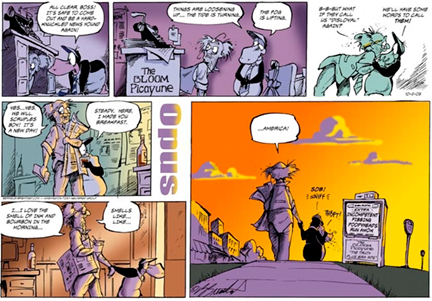
However, the battle is still far from over; Robert M. Gates who will replace Donald Rumsfeld as Secretary of Defense has a bit of history in the particular region we find ourselves currently embroiled in. Obviously I am aware that the world was a different place in the early 1980's, but the person to replace our heroically incompetent S.O.D. (nice acronym!) should be cut of different cloth rather than another official who is privy to programs of dubious legality, the flouting of international law, and assistance to our professed enemies no?
Well enough of that tack...
While I personally am far to cynical to ascribe the events of November 8th as a sea change, I do feel that, ‘throwing out the bums’, the American people have collectively repudiated the Rovian doctrine of rightist extremism and divisive discourse. Of course, the sheer number of convicted felons, gay pederasts, and suspected launderers in the halls of government surely only forced the issue. As it was pointed out on CNN last night, when one has to begin one's reelection campaign with an ad stating that "While I did regrettably cheat on my wife I never choked my mistress" surely it is an uphill battle at best. But, as so many have pointed out, the old axiom "Absolute Power Corrupts Absolutely" may well become the epithet awarded this period by generations of American History teachers to come.
However, I do not agree that the principle business of the newly minted legislators should be to immediately pursue impeachment against President Bush. While this stance might seem incongruous with my general attitudes towards government, despite his utter ineptitude President Bush has been wise enough to never spread his blend of lies and spin under oath. In fact, I may be wrong (please let me know if I am) but Bush has only been under oath twice: at both inaugurations. Without immediate perjury it could take a decade to unravel the layers of illegalities and deceit that have entrapped and perverted our country (but not in a Mark Foley way... sorry, couldn't resist!) and pursuing such a process would bring the nation to a standstill.
I am not advocating ignoring the probable crimes committed by this administration (felonious wiretapping for one) but I am advocating the beginning of a concerted effort to reverse the disastrous policies of this grim half decade, and a stringent rejection of any further policies. It is my hope that such a dramatic reversal of political course may not be an isolated event, but may be the beginning of a new progressive era in which issues of fiscal responsibility, social inequality, universal healthcare, and the just distribution of the bounty of our wonderful country may finally be addressed in an inclusive and comprehensive way.
If this is going to happen it is clear that the burden is squarely on our shoulders; we the people must advocate for such causes, intimidate our representatives by strenuously voting our social consciences. We must legislate big money out of the equation, accept responsibility for continuous governmental oversight, familiarize ourselves with the minutiae of major issues, openly debate issues in a congenial matter, and above all remember that, as shown for the third time, our vote is not only our ultimate responsibility as citizens and can singularly change the course of the nation
Now... I suppose I should write on some architecture soon...

However, the battle is still far from over; Robert M. Gates who will replace Donald Rumsfeld as Secretary of Defense has a bit of history in the particular region we find ourselves currently embroiled in. Obviously I am aware that the world was a different place in the early 1980's, but the person to replace our heroically incompetent S.O.D. (nice acronym!) should be cut of different cloth rather than another official who is privy to programs of dubious legality, the flouting of international law, and assistance to our professed enemies no?
Well enough of that tack...
While I personally am far to cynical to ascribe the events of November 8th as a sea change, I do feel that, ‘throwing out the bums’, the American people have collectively repudiated the Rovian doctrine of rightist extremism and divisive discourse. Of course, the sheer number of convicted felons, gay pederasts, and suspected launderers in the halls of government surely only forced the issue. As it was pointed out on CNN last night, when one has to begin one's reelection campaign with an ad stating that "While I did regrettably cheat on my wife I never choked my mistress" surely it is an uphill battle at best. But, as so many have pointed out, the old axiom "Absolute Power Corrupts Absolutely" may well become the epithet awarded this period by generations of American History teachers to come.
However, I do not agree that the principle business of the newly minted legislators should be to immediately pursue impeachment against President Bush. While this stance might seem incongruous with my general attitudes towards government, despite his utter ineptitude President Bush has been wise enough to never spread his blend of lies and spin under oath. In fact, I may be wrong (please let me know if I am) but Bush has only been under oath twice: at both inaugurations. Without immediate perjury it could take a decade to unravel the layers of illegalities and deceit that have entrapped and perverted our country (but not in a Mark Foley way... sorry, couldn't resist!) and pursuing such a process would bring the nation to a standstill.
I am not advocating ignoring the probable crimes committed by this administration (felonious wiretapping for one) but I am advocating the beginning of a concerted effort to reverse the disastrous policies of this grim half decade, and a stringent rejection of any further policies. It is my hope that such a dramatic reversal of political course may not be an isolated event, but may be the beginning of a new progressive era in which issues of fiscal responsibility, social inequality, universal healthcare, and the just distribution of the bounty of our wonderful country may finally be addressed in an inclusive and comprehensive way.
If this is going to happen it is clear that the burden is squarely on our shoulders; we the people must advocate for such causes, intimidate our representatives by strenuously voting our social consciences. We must legislate big money out of the equation, accept responsibility for continuous governmental oversight, familiarize ourselves with the minutiae of major issues, openly debate issues in a congenial matter, and above all remember that, as shown for the third time, our vote is not only our ultimate responsibility as citizens and can singularly change the course of the nation
Now... I suppose I should write on some architecture soon...


